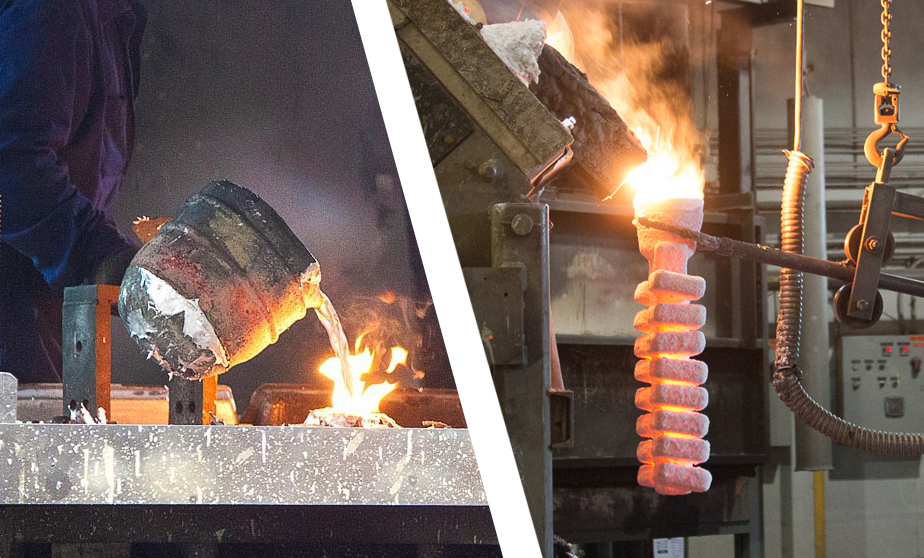The Greatest Guide To Stahl Specialty Company
The Greatest Guide To Stahl Specialty Company
Blog Article
Not known Facts About Stahl Specialty Company
Table of ContentsIndicators on Stahl Specialty Company You Should KnowExamine This Report on Stahl Specialty CompanyExcitement About Stahl Specialty CompanyThe Definitive Guide for Stahl Specialty CompanyThe Of Stahl Specialty Company
The subtle distinction exists in the chemical web content. Chemical Comparison of Cast Light weight aluminum Alloys Silicon promotes castability by decreasing the alloy's melting temperature and enhancing fluidity during spreading. It plays a critical role in permitting elaborate molds to be filled accurately. Furthermore, silicon contributes to the alloy's stamina and use resistance, making it beneficial in applications where sturdiness is critical, such as auto components and engine elements.It additionally enhances the machinability of the alloy, making it much easier to refine into ended up products. In this way, iron contributes to the total workability of light weight aluminum alloys.
Manganese contributes to the strength of aluminum alloys and improves workability. Magnesium is a lightweight element that offers toughness and influence resistance to aluminum alloys.
It allows the manufacturing of light-weight components with exceptional mechanical homes. Zinc boosts the castability of aluminum alloys and aids manage the solidification procedure throughout casting. It enhances the alloy's stamina and firmness. It is usually discovered in applications where detailed shapes and fine details are needed, such as attractive spreadings and certain vehicle parts.
See This Report on Stahl Specialty Company
Since aluminum-silicon alloys have good spreading residential or commercial properties, high gas properties, straightforward processes, and excellent rust resistance, aluminum-silicon alloys are most typically made use of in the die-casting market in your home and abroad. At the same time, aluminum-silicon alloys are likewise relatively very early and commonly identified alloys established and used in die-casting. After constant research and enhancement, a lot of the current global mainstream aluminum-silicon alloys have been settled and are absolutely nothing even more than A356, A360, A380, ADC12, B390, and A413.
The main thermal conductivity, tensile toughness, yield strength, and prolongation differ. Select appropriate resources according to the performance of the target product generated. Among the above alloys, A356 has the greatest thermal conductivity, and A380 and ADC12 have the lowest. The tensile limitation is the contrary. A360 has the very best yield stamina and the highest possible elongation price.

6 Easy Facts About Stahl Specialty Company Shown
In precision spreading, 6063 is well-suited for applications where detailed geometries and premium surface coatings are extremely important. Instances include telecommunication units, where the alloy's remarkable formability permits smooth and aesthetically pleasing designs while preserving architectural integrity. In the Illumination Solutions sector, precision-cast 6063 components produce classy and effective lights components that require detailed forms and good thermal efficiency.
(http://prsync.com/stahlspecialtycompany/)
The A360 shows premium elongation, making it ideal for complicated and thin-walled elements. In precision casting applications, A360 is well-suited for sectors such as Customer Electronics, Telecommunication, and Power Tools.

In accuracy spreading, light weight aluminum 413 shines in the Consumer Electronics and Power Equipment sectors. This alloy's premium rust resistance makes it an excellent option for outdoor applications, guaranteeing long-lasting, long lasting items in the pointed out industries.
8 Easy Facts About Stahl Specialty Company Explained
The aluminum alloy you pick will significantly influence both the spreading procedure and the residential properties of the last product. Because of this, you should make your decision meticulously and take an informed approach.
Establishing one of the most suitable light weight aluminum alloy for your application will imply evaluating a broad range of features. These comparative alloy attributes follow the North American Die Spreading Association's guidelines, and we have actually split them right into 2 classifications. Foundry. The initial classification addresses alloy characteristics that influence the manufacturing procedure. The second covers characteristics influencing the buildings of the end product.
The alloy you choose for die spreading straight impacts numerous aspects of the spreading process, like just how easy the alloy is to deal with and if it is susceptible to casting problems. Warm fracturing, likewise recognized as solidification splitting, is a common die spreading problem for aluminum alloys that can cause interior or surface-level tears or cracks.
Stahl Specialty Company Can Be Fun For Everyone
Specific light weight aluminum alloys are more prone to hot breaking than others, and your choice must consider this. Casting Foundry. It can damage both the cast and the die, so you ought to look for alloys with high anti-soldering residential properties.
Rust resistance, which is currently a remarkable attribute of aluminum, can differ significantly from alloy to alloy and is a necessary characteristic to consider relying on the ecological conditions your item will be exposed to. Put on resistance is one more residential property typically sought in light weight aluminum products and can differentiate some alloys.
Report this page